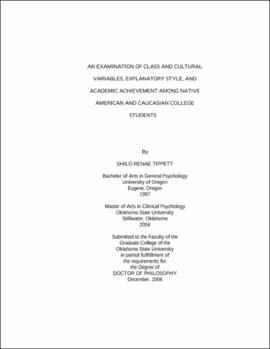| dc.contributor.advisor | Chaney, John M. | |
| dc.contributor.author | Tippett, Shilo Renae | |
| dc.date.accessioned | 2013-11-26T08:27:46Z | |
| dc.date.available | 2013-11-26T08:27:46Z | |
| dc.date.issued | 2006-12 | |
| dc.identifier.uri | https://hdl.handle.net/11244/6979 | |
| dc.description.abstract | Scope and Method of Study: The purpose of this study was to examine the relationship between several relationships which may impact the academic achievement of Native American college students. This study was designed to investigate (1) explanatory style and academic achievement among Native American and Caucasian college students; (2) the relationship of cultural identification and academic achievement in Native American and Caucasian college students; (3) the relative influence of parent education level and perceived deprivation on causal attributions and academic achievement for Native American students compared to Caucasian students; and (4) whether cultural identification and class variables were directly related to academic achievement or if the relationship was mediated by explanatory style. Participants were 71 Caucasian (16 male; 55 female) and 52 Native American (13 male; 39 female) undergraduate students recruited from Oklahoma State University. After giving informed consent to participate in the study, students completed questionnaire packets. | |
| dc.description.abstract | Findings and Conclusions: Primary analyses testing revealed significant findings. However, findings were not in the predicted direction. More pessimistic explanatory style on the AASQ was associated with lower levels of academic achievement among Native American participants. Analyses testing failed to reveal a significant relationship between explanatory style and academic achievement among Caucasian participants. Contrary to prediction, the data indicated cultural identification was not related to academic achievement for Native American participants. Cultural identification was unrelated to academic achievement among Caucasian participants. No significant findings were found regarding perceived deprivation and socioeconomic status on academic achievement among both Native American and Caucasian samples. PDS scores had no effect on Spring GPA among Native American students. In the Caucasian sample, parent education level had no effect on Spring GPA. | |
| dc.format | application/pdf | |
| dc.language | en_US | |
| dc.rights | Copyright is held by the author who has granted the Oklahoma State University Library the non-exclusive right to share this material in its institutional repository. Contact Digital Library Services at lib-dls@okstate.edu or 405-744-9161 for the permission policy on the use, reproduction or distribution of this material. | |
| dc.title | Examination of class and cultural variables, explanatory style, and academic achievement among Native American and Caucasian college students | |
| dc.contributor.committeeMember | Callahan, Jennifer L. | |
| dc.contributor.committeeMember | Page, Melanie C. | |
| dc.contributor.committeeMember | Jacobs, Sue C. | |
| osu.filename | Tippett_okstate_0664D_2096.pdf | |
| osu.accesstype | Open Access | |
| dc.type.genre | Dissertation | |
| dc.type.material | Text | |
| thesis.degree.discipline | Psychology | |
| thesis.degree.grantor | Oklahoma State University | |
